Why lifting COVID-19 restrictions is a bad idea for asthma people? This type of activity increased the risk of a severe asthma attack by double.

‘Adults with asthma faced an increased risk of a severe attack after COVID-19 restrictions were relaxed.’





Asthma affects more than 5 million people in the UK and more than 300 million people globally. Symptoms include breathlessness and chest tightness as well as wheezing and coughing.Published in Thorax and presented at today’s British Thoracic Society meeting, the research found an increased risk of these attacks after COVID-19 restrictions were relaxed.
Severe Asthma Attacks Doubled After COVID Restrictions were Lifted
When restrictions were lifted, fewer people wore face coverings, there was more social interactions, and subsequently a higher risk of COVID-19 and other acute respiratory infections. The research also found that COVID-19 was not significantly more likely to trigger asthma attacks than other respiratory infections.In April 2021, when social restrictions and the need for face coverings started to be relaxed, 1.7 percent of participants reported having a severe asthma attack in the previous month. In January 2022, this proportion more than doubled, going up to 3.7 percent.
The study analyzed data from 2,312 UK adults with asthma, who participated in Queen Mary’s COVIDENCE UK study between November 2020 and April 2022. Details on face covering use, social interactions, and asthma symptoms were collected via monthly online questionnaires.
This research shows that the relaxation of COVID-19 restrictions coincided with an increased risk of severe asthma attacks. This study was observational, so it can’t prove cause and effect.
Advertisement
It is also reassuring to see that COVID-19 was not significantly more likely to trigger asthma attacks than other respiratory infections in our study participants.
Advertisement
Source-Eurekalert















